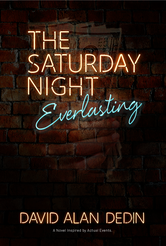THIS REVIEW IS FROM THE BOOK'S PART ONE AND PART TWO.
THE READER HASN'T READ PART THREE YET.
(Also - This was the very first draft of the book.)
These comments contain many plot spoilers, especially detailed ones about the novel's ending. Also, this reader was given an early draft of the novel's ending - which has changed considerably since this review was written. Quite frankly, the original ending had no hope - the new ending is full of joy.
Hi David,
Thank you again for letting me beta read your novel. I also read the synopsis you sent to get a better idea on the direction the novel is going. Here are some of my notes.
Prologue:
Frankie relishes the sensations he feels on the roof. The colors, coolness of the air, and city lights stand out as if he is feeling for the first time in a long while. It is a moment of marked release and seems metaphorical of his actual "escape" from the constraints he felt before. The background music echoes this idea of escape and release and ultimately will foreshadow his actions.
**There is a pervading idea of being chained/constrained by the past. Literally within the elements of bondage within the leather community but also figuratively within the minds of the characters. Frankie cannot escape his memories, many of which are too painful to dwell on for too long. He's forever prevented from moving forward due to both past trauma and grief. Similarly, the leather community itself is fragmented with the old guard holding onto the past traditions that made the community and formed its foundation and the new guard with its leanings toward fresh ideas, technology, and protocols.
**Side note, this is why Jordan is the personality with Frankie at the end. He of all the personalities seems the most vulnerable but also has the best chance saving Frankie as they both have attempted suicide and Jordan, unlike the others, represents a fresh generation that can both revere the past and move into the future. Jordan is the bridge within Frankie and his best hope for the future, though ultimately not strong enough to overcome Frankie's most volatile personality.
Magic Realism:
There is an element of the fantastic through the novel. From the way the city comes to life for the characters to the moments of whimsical musical numbers. From the beginning, Frankie's personalities are presented to the reader not as fragments of one man, but as individual men able to navigate the city and interact with others (sometimes at the same time and in different locations). This reinforces the idea that these personalities are very real to Frankie and act as independent entities.
As a reader, we know how deeply Frankie wants connection with another person, but the strength of his other personalities (who have desires of their own) inhibit his ability to make the connection with another person that he longs for, and also adds to the pain he feels over his lost love from years earlier. Frankie notes that he wants a deep connection with a man that can only be achieved in his words through bdsm. He says vulnerability goes both ways, but Frankie is himself so fragmented that establishing the true vulnerability required for this deep connection is always just out of reach. The trust required of such a relationship is impossible when Frankie does not truly know himself (as evidenced later when the hidden personality appears). In addition, the desires of one of his personalities will not necessarily fulfill the desires of all the personalities, let alone Frankie.
Mortality:
The novel wrestles, from the beginning as Frankie attempts suicide, with mortality and the fleeting nature of time. Frankie struggles with alcoholism and past addiction and his cirrhosis diagnosis is at the critical stage where only a liver transplant will save his life. He circles around this fact, like a man leering over the edge into an abyss, toying with not even attempting the surgical procedure which would mean ultimately dying of his disease. Frankie sees himself as a young man, like his alter Jordan, but is often jarred by the physical appearance he gets glimpses of which show a man in his 50s (where Alan exists). Russ too feels the weight of age and though he acts as a mentor for younger men within the community, he carries deep regrets over aging. Frankie is haunted by his past fears of HIV, something that haunts the community he is in and stands in stark contrast to the frenetic motion and life of the bar scenes. The neon lights of the city, particularly of the bars, create this energy which represents the life blood of the leather community while also highlighting the transitory nature of the men who exist within it. They blink in and out of existence as the years pass, each one standing on his own for a brief moment in time while the whole (Touche itself) lives forever.
Connection:
Frankie longs for this but connection is always just out of reach. He notes that the leather community is more than bdsm and protocol. It exists as a family, a brotherhood, and the shared traditions, styles of dress, and bar scenes create a sense of camaraderie. This is Frankie's adopted family. It is said there is a family that we are born with and a family that we choose. Frankie has chosen his family and we learn that he made this choice from his young years after a suicide attempt when Brian first appeared and acted as Frankie's protector. Frankie's own childhood family failed him, with an abusive/alcoholic father whose own self hatred affected Frankie and a mother who betrayed Frankie's love and trust by allowing her own shame and abuse to spill over onto her son. Frankie needed a protector, a brother, and a friend. As Frankie slips more and more toward self destructive behavior, Brian is the first personality to be destroyed. With his protector removed, Frankie's darker personality can finally fulfill his own destructive nature. But this time, it's the memory of love and connection that causes Frankie to move toward ending his life as opposed to the deep loneliness he felt in that first attempt years before. He's consumed by his regret and loss and the intensity of the love he once felt. Jordan's love is not enough to pull Frankie back. His darker personality ultimately takes over and he jumps. The reader is made to feel the culmination of a lifetime of shame, loneliness, regret, and deep deep loss. It is a modern tragedy.
- Rachel
a former Barnes & Noble Manager]]>

At this point in time, to my knowledge, there are no posted reviews of The Saturday Night Everlasting online. As they become available, I will cut/paste them to this page.
- Dave
]]>- Dave

4.0 out of 5 stars Cool universe to explore, dragged down by social commentary and grammar issues
From AMAZON: Reviewed in the United States on October 21, 2017
Not usually the subject matter that I read but I have to say that I was pleasantly surprised. I personally think that there was a really solid story line here that needed a little more development. The idea was there but I think that the sexual and alcoholic issues described in the book over shadowed these ideas. Those thoughts coupled with some spelling and grammar issues (which were pretty easy to spot) bring my rating of the book down.
I would say that this book has a really cool universe that would be really interesting to explore, but some of the social commentary drags it down.
- Joe
]]>From AMAZON: Reviewed in the United States on October 21, 2017
Not usually the subject matter that I read but I have to say that I was pleasantly surprised. I personally think that there was a really solid story line here that needed a little more development. The idea was there but I think that the sexual and alcoholic issues described in the book over shadowed these ideas. Those thoughts coupled with some spelling and grammar issues (which were pretty easy to spot) bring my rating of the book down.
I would say that this book has a really cool universe that would be really interesting to explore, but some of the social commentary drags it down.
- Joe